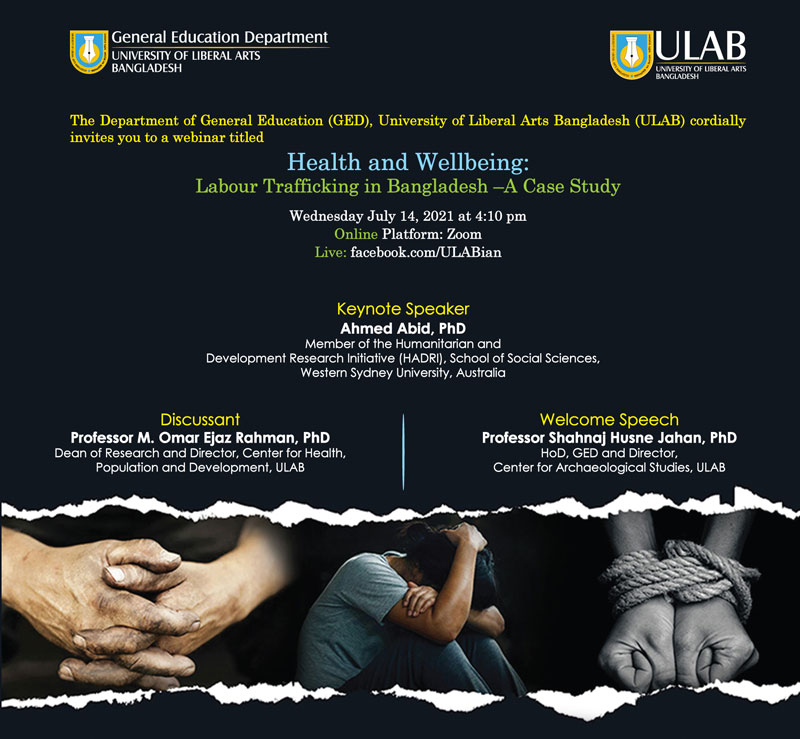Health and Wellbeing: Labour Trafficking in Bangladesh - A Case Study
This presentation gives an account the effects of irregular migration on health and wellbeing, and related functional outcomes of irregular migration mainly on the trafficked returnees from Bangladesh. Through Semi-structured interviews conducted in 2018 with adult male survivors and community stakeholders in 3 trafficking prone regions; Narayanganj-Narshingdi, Sirajganj and Cox’s Bazaar findings offer insights critical to our understanding of recent trend of labour migration narrative. Findings detail that informal migrants were abused and tortured by their traffickers. This presentation first analysed their motivations to acquire financial resources through migration and then the effects of resource loss on health, wellbeing and daily functioning. The study reveals the respondents had been through intimidation and physical assaults, torture as well as psychological abuse by the trafficker and immigration authorities or other stakeholders. The study reveals that a significant number of the returnees have ongoing health problems and some of them had injuries to their limbs and organs that limit their work and social functioning that continued to affect them long after their return home. Ongoing physical or psychological injuries resulted in full or partial limiting of the capacity for paid work with 40 percent of respondents two years post-migration, contributing to their ongoing debt. In addition, around two thirds of 25 respondent reported mental health impacts since their return, including loss of self-confidence and peace of mind (10/25), and more pronounced anxieties, depression and trauma symptoms (8/25).
This is part of Ahmed Abid’s (Ahmed Abidur Razzaque Khan) Ph.D research titled ‘The psychosocial impacts of labour trafficking in Asia: a study of returned Bangladeshi survivors’. The study been conducted under research cluster of Humanitarian and Development Research Initiative (HADRI), School of Social Science, Western Sydney University. His joint Ph.D. in ‘Human Rights, Society, Multi-level Governance’ was co-managed by Universities in Australia, Croatia, Cyprus, and coordinated by the Human Rights Centre- University of Padova (Italy).
Bio -blurb
Ahmed Abidur Razzaque Khan (Ahmed Abid) is a filmmaker with a Ph.D. in Human Rights. He is a member of Humanitarian and Development Research Initiative (HADRI) at the School of Social Sciences, Western Sydney University, Australia. His joint Ph.D. in ‘Human Rights, Society, Multi-level Governance’ was co-managed by Universities in Australia, Croatia, Cyprus, and coordinated by the Human Rights Centre- University of Padova (Italy). He has more than fifteen years’ experience in humanitarian and crisis management including carrying out academic research work in Asia and the Pacific. He worked as long-term election observer in Cambodia for ANFREL, as Knowledge Management Coordinator for the largest human rights project (SEARCH in SE Asia) funded by Canadian government and managed research projects at the CARE-LAB of Communications and New Media Department, National University Singapore.
His research discipline focus has been on safe migration, refugees and labour trafficking, and vulnerable groups including children, women and ethnic minorities with a particular focus on forced migration. He is experienced in using a range of media and methodology tools and has worked with quantitative, qualitative, and mixed methods research approaches. His Digital Humanities (DH) work include research-based films on Rohingya and Bangladeshi boat people The Dreaming Vendors (Bangladesh-Thailand), Votes Echoing Hope (Afghanistan) and Click to Protect, Change to Connect (Brazil-Thailand) on vulnerable children. He organized humanitarian events including ‘Rohingya Reality Rights’ with multi-sectoral partners in Sydney (2018) and organized the first traveling human rights film festival in Thailand (2009) as the Artistic Director which demonstrated his creative management skill.


